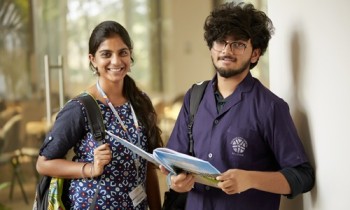This lab provides in-depth first-hand knowledge of various instrumental techniques, with particular emphasis on real time spectrometers. Experiments for both qualitative and quantitative analysis of bimolecular proteins like DNA, RNA, etc. are carried out with the aid of a wide variety of equipment like colorimeters, spectrophotometers, fluorimeters, etc. Analytical techniques like paper and thin layer chromatography are also practiced. This lab is equipped with sophisticated instruments such as a laminar air flow chamber, and a CO2 incubator, an inverted microscope, UV-Vis Spectrophotometer, water bath and Chemical Fume Hood. Clean room facilities are also available in this lab.
Microbiology LaboratoryThis lab will enable students to understand and describe staining techniques, media selection, incubation conditions, colonial morphology, biochemical and serological reactions, and antibiotic sensitivity patterns of routine Bacteria, Viruses, Parasites, etc. Students gain acquaintance with the microbial technology skills by working with state -of -the-art equipment such as Laminar Flow Chamber, Orbital Shaking Incubator, and Vertical Autoclave, etc., This lab is well equipped with BSL II, Orbital shaker, 4°C Refrigerator, Water bath and Hot air oven.
Molecular Biology and Genetic Engineering LaboratoryThe objective of this lab is to provide a working knowledge of fundamental and advanced techniques like PCR, Blotting Techniques, Electrophoresis etc., that are used for the separation of amplification and cloning of isolated DNA into various types of vectors. Screening of such recombinants is also undertaken. Demonstration of mutagenesis helps the students to understand the mutation phenomenon. This lab is well equipped with a thermal cycler, Refrigerated microcentrifuge, orbital shaking incubator, SDS PAGE, -20°C Deep Freezer, Ice flaker, gel rocker, Vortex mixer, Microwave oven, 4°C refrigerator, Western Blot apparatus.
Tissue Culture and Bioprocess LaboratoryIn this laboratory, students will be taught to carry out in vitro creation of new plantlets and thereby learn the art and science of plant multiplication. With the aid of available modern trend and instruments, students will practice the various steps involved in the application of this technology such as stock plant care, explant selection, sterilization, and media manipulation to obtain proliferation, rooting, acclimatization, and growing in sterile cultures to maintain parent lines. Students are exposed to clinical medicine and will be assigned laboratory exercises for acquainting them with the latest advances in immunological techniques today. This lab is equipped with a laminar air flow chamber, Refrigerator, Autoclave, Tissue Culture rack with illuminated, tube lights with glass transparent shelves. LPG gas cylinder connected- burner to maintain sterile hood for explant to transplant.
Center of Excellence (COE) in Bioresource utilization and managementThe Center of Excellence in Bio-resource Utilization and Management is provided by VFSTR to provide state-of-the-art facilities for students and scholars. The advanced instruments namely ELISA, PCR, HPLC, Sonicator and UV-Vis Spectrophotometer, Fluorescence Spectrophotometer and Gel Doc are regularly being used by the students for the senior-year capstone projects.
Brief description of Instruments in the Center of ExcellenceInstrument: High Performance Liquid Chromatography
High performance Liquid Chromatography is a powerful tool popularly used in the analysis of chemical compounds. It allows the user to spend a minimal sample size and reap maximum results. The chemical compounds are analyzed by a high-efficient and sensitive photodiode array detector (DAD).
Instrument: UV-Vis SpectrophotometerCary 60 is a cuvette-based versatile spectrophotometer capable of reading samples from 190 nm to 1100 nm with a 1 nm increment. The system is also fitted with a Peltier device for temperature regulation ranging from 0 °C to 100 °C to study temperature dependent chemical kinetics
Instrument: Fluorescence spectrophotometerCary Eclipse is a cuvette-based highly sensitive and efficient fluorescent spectrophotometer. It can handle fluorescence, phosphorescence, chemo/bioluminescence, and time-resolved phosphorescence measurements very easily. The software is very user-friendly and application specific.
Instrument: Inverted Fluorescence MicroscopeAn Inverted fluorescence microscope is a user-friendly and ergonomic tool for visualizing animal cells under fluorescence and phase contrast fields. The microscope is fitted with 4 different filters viz., red, blue, green, and violet that covers a wide range of fluorophores and gives the user a greater choice for dye selection. It has got high-quality objectives-4X, 10X, 20X, and 40X. The stage of the microscope is interchangeable to accommodate different kinds of culture wares.
Instrument: Upright Fluroscence MicroscopeIt is an ergonomic bright field and fluorescence microscope used for teaching, training, and routine applications. It is fitted with 4X, 10X, 40X, and 100X (oil immersion) objectives. Two fluorescence filters-blue and green provide fluorescence fields to work with different experiments. The microscope is also fitted with Olympus digital camera for efficient digital imaging and documentation.
Instrument: Microtiter Plate ReaderELx800 is a filter-based absorbance reader for 96-well plates. It measures optical density, absorbance, and transmittance at 405 nm, 490 nm, and 630 nm. It is suitable for applications in experiments pertaining to clinical, biotechnology research, and pharmaceutical laboratories.
Instrument: Microtiter Plate ReaderMulti-scan FC is a monochromator-based reader capable of reading 96-well and 384-well plates at wavelengths ranging from 340 nm to 850 nm. It is also equipped with shaking and incubation up to 50 °C for kinetics studies. Various assays such as Immunoassays (ELISA), protein assays, endotoxins, cytotoxicity, proliferation assays, enzyme assays, and growth curves can be performed with ease using the SkanItTM Software.
Instrument: SonicatorSonicator is a probe equipment used for efficient disruption of materials. It is suitable for breaking Bacterial cells, bacterial spores, and Animal & plant Cells. Also used for degassing, emulsifying, Cleaning, Mixing, etc
Instrument: UV-VIS SpectrophotometerUV-1800 is a compact cuvette-based UV-ViS spectrophotometer that can be used either as a stand-alone instrument or as a PC-controlled instrument. It offers a high resolution of 1nm wavelength reading ranging from 180 nm to 1100 nm. Users can analyze data on a PC using UV Probe software. In addition, data for spectra and time-course curves can be displayed and saved with commercial spreadsheet software.
Biochemical engineering LaboratoryThe biochemical engineering laboratory focuses on complex life systems and the heart of biochemical processes, the fermenter. Students learn enzymatic reaction kinetics, cell growth kinetics, and operational parameters. Biomolecule production using enzymes and microbial cells is explored. The course distinguishes conventional chemical reaction engineering from biochemical reaction engineering. Students gain expertise in designing and optimizing biochemical processes for industry. Fermentation aspects cover optimization, inoculum preparation, monitoring, kinetics analysis, scale-up considerations, contamination prevention, and troubleshooting. The biochemical engineering laboratory also includes the study of different types of reactors: batch reactors, continuous stirred-tank reactors (CSTRs), and plug-flow reactors (PFRs). Students gain practical experience with reactor design and operation, exploring various modes of operation and their applications in biochemical processes. This hands-on experience enhances their understanding of reactor systems in biochemical engineering. This knowledge will enable them to design and implement efficient biochemical processes, preparing them for careers in various industries that rely on biochemical engineering.
Animal House FacilityUsing the animal house facility small laboratory vertebrates are developed as models for immunological, malignant, fibrosis, and neurological disorders using the animal house facility. Animal houses are registered with Committee for Purpose of Control and Supervision of Experiments on Animals (CPCSEA), MHRD bearing the registration number 2046/PO/ReBi/S/18/CPCSEA. Fully functional with separate housing rooms for mice, rats, guinea pigs, rabbits, and hens. All cubicles are equipped with an air conditioning facility, lighting, dehumidifier, compound microscope, refrigerator, and incinerator. The Snake pit track is designed around the animal house. A Storeroom, experimental room, and tap water connections are available in this facility.











